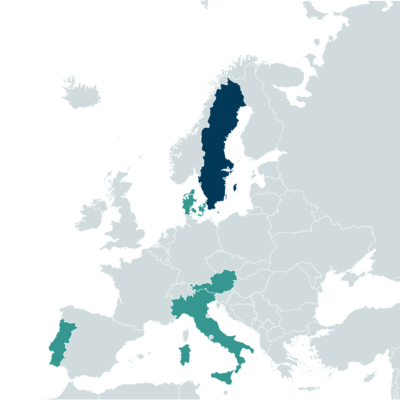
AirBiD – Airborne Biological Diversity shaped and modelled by Urban Green Elements
Call
Duration
01/02/2025 – 30/01/2028
Total grant
Approx. 1.4 mil. €.
More information
Nestor González Roldán
nestor.gonzalez.roldan@bioenv.gu.se
Partners of the project
- Department of Biological and Environmental Sciences / Pollen Laboratory, University of Gothenburg, Gothenburg, Sweden
- Department of Environmental Science, Aarhus University, Roskilde, Denmark
- Research and Innovation Centre of The Edmund Mach Foundation, San Michele all’Adige, Italy
- Chemistry Department, University of Evora, Evora, Portugal
- Unit Bioresources, AIT Austrian Institute of Technology GmbH, Tulln, Austria

Context
The air we breathe is filled with biological particles like bacteria, fungi, and pollen, which together make up the “aerobiome.” This aerobiome can influence our health and well-being in many ways. Urban green elements, such as parks, gardens, and green rooftops, play a key role in shaping this invisible world. However, we still do not fully understand how these green areas influence air biodiversity. A high biodiversity of airborne organisms is expected to have a positive effect on health and well-being, mitigating the negative impacts of increasing urbanization.
Main objectives
The AirBiD project aims to uncover the hidden connections between urban green spaces, airborne biodiversity, and human health. By doing so, we aspire to improve urban planning and make cities healthier and more sustainable.
- Understanding airborne biodiversity: we will study how urban green spaces influence the aerobiome, focusing on five cities across Europe;
- Create useful tools: our consortium will develop maps applicable by city planners and communities to show the connection between green spaces, the aerobiome, and air quality;
- Promoting health and well-being: by investigating how air quality, shaped by biodiversity, affects health and well-being, we aim to emphasize the advantages of greener, more biodiverse urban environments;
- Engaging communities: through fun and interactive citizen science activities, we will involve residents in our research and raise awareness about the importance of biodiversity;
Sharing solutions: finally, we will offer practical guidance on creating and maintaining green spaces that enhance air quality, boost biodiversity, and promote healthier urban living.
Main activities
- Fieldwork in five cities: AirBiD will collect air samples from urban green spaces and nearby areas in Copenhagen (DK), Evora (ES), Gothenburg (SW), Trento (IT) and Vienna (AU);
- Cutting-edge science: AirBiD will use advanced DNA techniques to identify the microorganisms and biological particles in the air, combining these findings with results from conventional methods like microscopic analysis;
- Citizen science: AirBiD will involve local communities in collecting data and learning about biodiversity through workshops and events;
- Mapping and modelling: AirBiD will create platform-independent tools based on open data formats that show how green spaces affect air quality and biodiversity, facilitating informed decision-making by policymakers, stakeholders and communities;
- Sharing results: AirBiD will disseminate knowledge through public talks, published articles, and infographics, offering guidelines for urban green spaces to support informed policymaking and highlight the impact of urban green spaces on the quality of the air we breathe.
